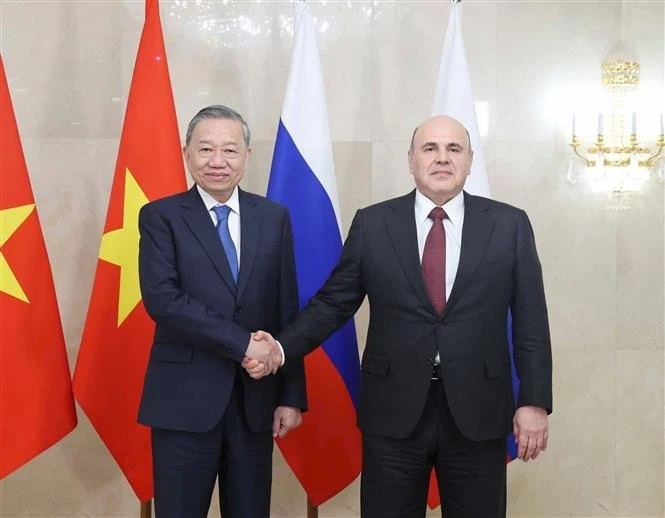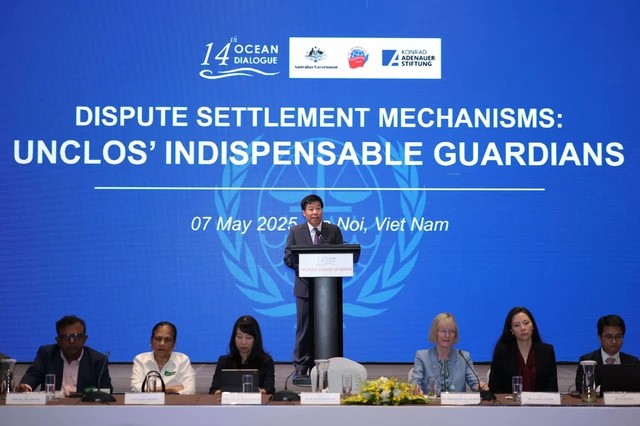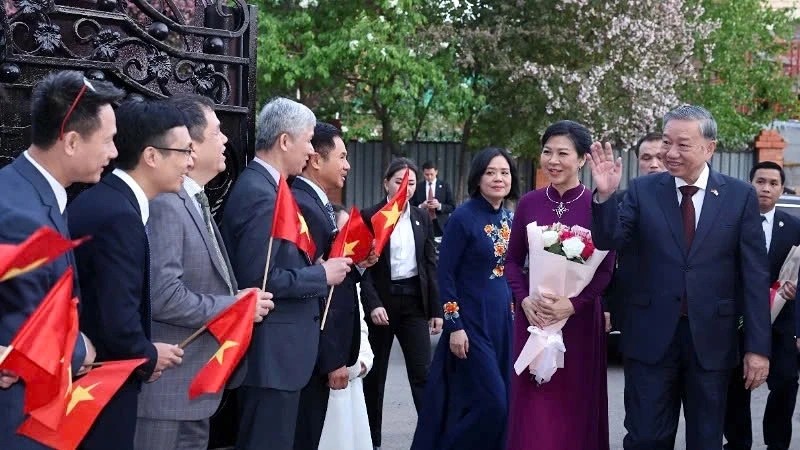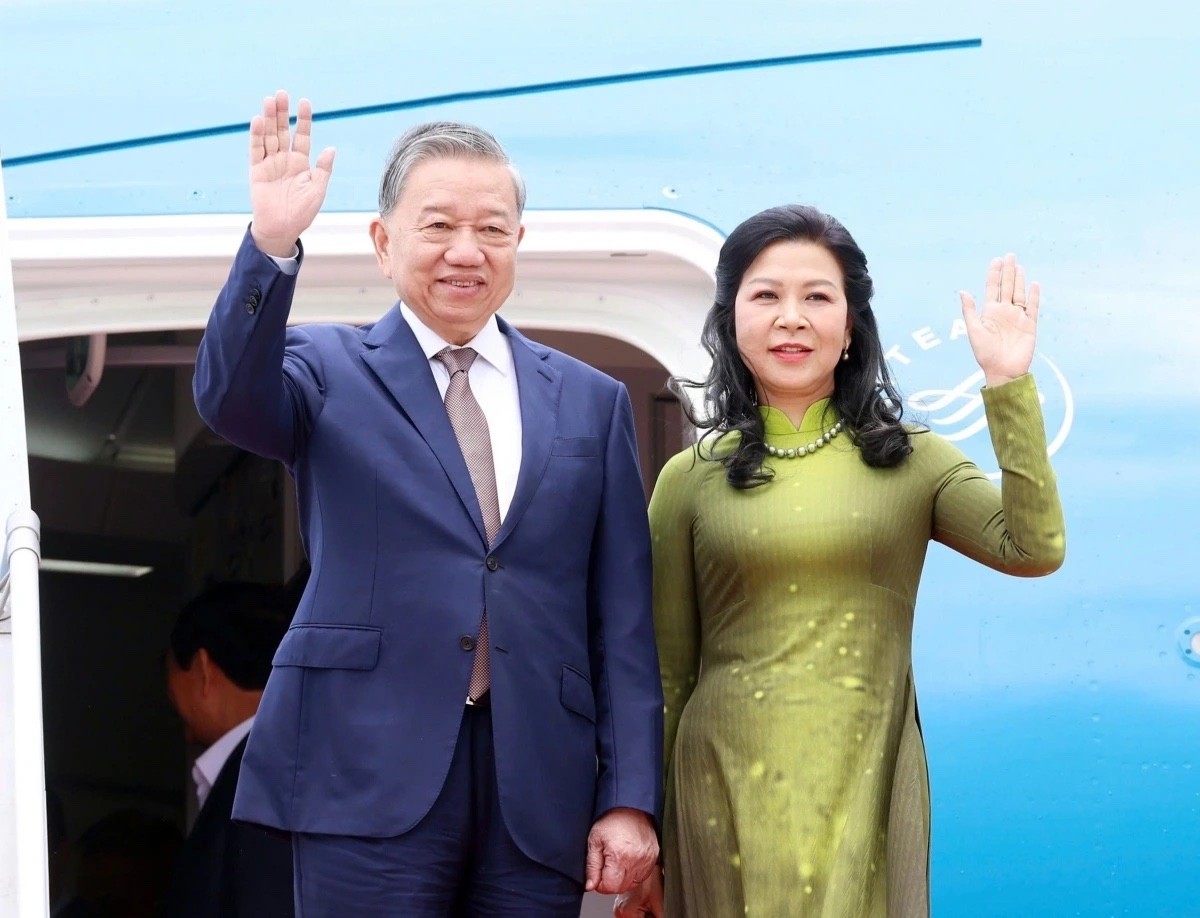Former US diplomat says China aggressively pursuing hegemony over East Vietnam Sea
David Brown, a former U.S. diplomat and a freelance writer on the East Vietnam Sea disputes, told Tuoi Tre News in an interview on Sunday that the U.S. has to regard China's aggressive pursuit of hegemony over the sea as “disruptive” and “potentially dangerous.”
Chinese land reclamation activity and installation construction at Bai Tu Nghia (Hughes Reef) in Vietnam’s Truong Sa (Spratly) archipelago has been identified for the first time by satellite imagery analysed by IHS Jane's Defense Weekly, based in Coulsdon, Surrey (England).
According to IHS Jane's Defense, the imagery, provided by Airbus Defence and Space and taken in January, also shows the progress of construction at Gac Ma (Johnson South Reef), belonging to the Spratly archipelago as well.
IHS Jane's previously used AIS transponder signals to monitor the movements of the Chinese dredger Tian Jing Hao through the Cum Dao Sinh Ton (Union Banks) and Cum Dao Nam Yet (Tizard Banks) regions in late 2013 and early 2014. It was present at Hughes Reef between March 20 and April 3, 2014.
The U.S. military has acknowledged that it is flying its most-advanced surveillance aircraft, the P-8A Poseidon, over the East Vietnam Sea. Will Washington provide Vietnam with information acquired by the P-8A Poseidon?
The U.S. has intensified surveillance of the [East Vietnam Sea] area since the HD981 incident last summer and, of course, it has closely monitored China's 'island-building' activity on the Spratlys’ rocks and reefs. It is also assisting Vietnam and the Philippines to upgrade maritime surveillance capabilities and doubtless has shared surveillance information in this respect.
For many years, the U.S. has relied on the P-3, an aircraft put into service in the 1960's, for surveillance tasks. The first P-8, based on the Boeing 737 airframe, with a longer cruising range than the P-3 and state of the art electronic equipment, entered service in 2012.
Victor Gao, Director of the China National Association of International Studies, toldRussia Today that China considers growing U.S. military activity in the waters of the East Vietnam Sea as hostile, which may lead to destabilizing the situation in the disputed region. What do you think?
Speaking at a Senate Armed Services Committee hearing on worldwide threats last Thursday, Director of U.S. National Intelligence James Clapper said China is expanding its outposts in the East Vietnam Sea to include stationing for ships and potential airfields as part of its “aggressive” effort to exert sovereignty.
His comments underscore U.S. concern over land reclamation activities that could fuel tensions between China and its neighbours over disputed islands and reefs.
The U.S. intelligence chief described China’s claims traced by a so-called nine-dash line a rough boundary covering more than 80 percent of the East Vietnam Sea as “exorbitant.”
Take the U.S. out of the [East Vietnam Sea] equation and a radically different outcome may be inevitable. The U.S. has two objectives. First, it has a strong, long-standing interest in the safety of navigation through the [East Vietnam Sea]. Like other nations whose prosperity depends importantly on unimpeded commercial shipping in this "Asian Mediterranean," the U.S. has to regard China's aggressive pursuit of hegemony over the [East Vietnam Sea] as disruptive and potentially dangerous. American deployment of military forces in the Western Pacific is intended to help maintain an environment that permits continued highly profitable trade relations among all nations, notably including China. Second, it is a fundamental principle that no nation, however large and strong, has the right to bully others. The principle of the 'international order' is no less valid even though it has often been flouted. A system of international law is available to sort out claims to sovereignty in the [East Vietnam Sea], and Washington will, to the extent possible, foster conditions that favor such a peaceful reconciliation of rival claims.
Chinese Foreign Ministry spokesman Hong Lei said his country's activities on shoals and in surrounding waters it claims are "reasonable, legitimate and legal" and that its attitude has been one of "restraint and responsibility.” Can you comment on Beijing’s “restraint and responsibility”?
That's China's opinion. China has taken possession of seven 'features' – rocks and reefs – in the Spratly Archipelago, in one case (Johnson South Reef) after a fierce battle with Vietnamese forces in 1988. It agreed, when it signed the ASEAN Declaration on the Conduct of Parties in the [East Vietnam Sea] (DOC) in 2002, to refrain from “activities that would complicate or escalate disputes and affect peace and stability.” An impartial observer would surely conclude that China's island-building activity is neither restrained nor responsible. China claims, further, that it is just 'catching up' with activity by other countries like Vietnam. But in fact Vietnam has just enacted anti-erosion measures on some islands of the Spratlys while China’s land “reclamation” is far more ambitious.
How should countries with sovereignty claims and other legitimate interests in the East Vietnam Sea react to China’s expansion?
Cooperation among the ASEAN claimants to various reefs, rocks and islands in the [East Vietnam Sea] is urgent. Malaysia, Brunei, the Philippines and Vietnam ought to have gotten together long ago to sort out their respective claims. It is time to form up a united front vis-a-vis China and it should be an urgent and top priority task of Vietnamese diplomacy. Indonesia and Singapore should be invited to join such talks as observers and facilitators. Success in establishing a joint ASEAN claimants' position would facilitate dealing with China.
The Center for Strategic and International Studies based in Washington D.C. said China is unusual in how it has been "dramatically changing the size and structure of physical land features." Could you address this point more specifically?
Though Beijing claims it is only 'catching up,' Chinese engineering activity in the Spratlys dwarfs the activity of Vietnam, Malaysia and the Philippines combined. The scale and speed with which China is establishing these 'facts' confirms that a hawk faction controls [East Vietnam Sea] decision-making in Beijing. Many in the Chinese party and government believe that an aggressive posture is not in China's long term interest but they have been shouted down by so-called 'patriots.'
Many observers say Vietnam may have to worry about a permanent Chinese military presence off its southeastern coast because Chinese motives for militarizing the Spratlys may not be purely defensive. What do you think?
Those 'observers' are correct. China aims to establish its hegemony over all of the [East Vietnam Sea]. The engineering works that China has in progress in the Spratlys will facilitate Beijing's 'force projection' capability toward the southern part of this vast maritime area.
Expansion activities by China in Vietnam's Spratlys. Source: IHS Jane's Defense Weekly
 |
David Brown is a freelance writer on contemporary Vietnam, with particular reference to that nation's political and economic life, international relations, media culture and environmental challenges and to territorial disputes in the East Vietnam Sea.
Brown's work as an American diplomat first took him to the embassy in wartime Saigon from 1965 to 1969. Subsequently he served the U.S. Government for 31 years in several other Asian and European capitals as well as in Washington, D.C.
Following his retirement from the U.S. State Department, Brown was a vice president of the Stanton Group, a developer of energy infrastructure projects.
Then, in 2005-2008, he returned to Vietnam to lead Fauna & Flora International's environmental education program for secondary and college-age students of the Ha Long Bay area.
In 2008, Brown moved to Hanoi, where he was an editor and staff trainer at the online newspaper VietNamNet Bridge, a contributor to the executive intelligence service Oxford Analytica, an instructor in ‘the Art of Translation’ at Hanoi Foreign Language University and a lecturer on contemporary Vietnam and Cambodia to groups of Western travelers.
In 2011, he began contributing articles to the online regional journals Asia Times and Asia Sentinel, in 2012 also to Yale Global and East Asia Forum, and now also to China Economic Quarterly, Asianomics, The National Interest and Foreign Affairs. Brown lives in Fresno, California.
Tuoitrenews.vn
Recommended
 National
National
Vietnam News Today (May 11): Vietnam, Austria to Boost Cooperation in High-Tech Development, Innovation
 National
National
Vietnam News Today (May 10): Vietnamese Peacekeepers Honored with UN Medal in South Sudan
 National
National
Vietnam News Today (May 9): Vietnam Ready to Work With Russia to Elevate Relations
 National
National
Vietnam News Today (May 8): Vietnam Remains Committed to UNCLOS
Popular article
 National
National
Vietnam News Today (May 7): Vietnam Hosts Over 7.67 Million International Visitors in First 4 Months
 National
National
Vietnam News Today (May 6): Party Leader To Lam Meets Vietnamese Expatriates in Kazakhstan
 National
National
Boarding Kindergarten Children Supported with VND360.000/Month
 National
National



